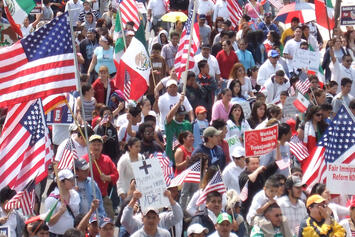
Support for the Democrats among black voters shows signs of some erosion, but it’s Latinos – now the country’s largest racial minority – who may prove the critical decider of the 2024 election. Latinos are now the largest ethnic minority in the nation, increasing in number by 23 per cent from 2010 to 2020, and they now account for 62.1 million, or 18.7 per cent, of the total US population. In California, Latinos represent nearly 40 per cent of the population.
Unlike African Americans, of whom 80 per cent or more are likely to vote for Democrats, Latinos are far more evenly divided. The Democratic share of Latino voters, nearly 70 per cent in 2016, is now only slightly above half. Latinos constitute nearly 15 per cent of all eligible voters, although they tend to turn out less than other groups, and by 2030 that share could close to double. Latinos could prove decisive in many key battleground states, such as Nevada, Arizona, Pennsylvania and Georgia.
In the past, progressives have assumed that, as “people of colour”, Latinos would be a sure constituency for Democrats. But it’s likely that economic factors are more determinative than racial considerations in voting patterns. Projections indicate that, between 2020 and 2030, Latinos will account for 78 per cent of net new US workers.
Critically, Latinos, especially males, are particularly prominent in manufacturing, agriculture, transportation and construction. People who work with their hands and small businesspeople trend towards the Republican Party, while those who work as yoga instructors, teachers, environmental consultants, and lawyers tend to be Democrats. Black voters, meanwhile, are overrepresented in government work such as transit workers and nursing assistants, constituting over 18 per cent of the federal government workforce, roughly 50 per cent above their share of the population. Hispanics represent less than 10 per cent of the federal workforce, roughly half their share of the population.
Latinos are also prominent in the small business sector. They initiate more businesses per capita than any other racial or ethnic group. Most Latino small businesses are small and family-run, representing the fastest-growing group of entrepreneurs in the United States. Over the past decade, the number of Latino business owners grew by 34 per cent, compared to only 1 per cent for all business owners. Like people in manual professions, small business owners tend to tilt towards the GOP, perhaps attracted by their pledge of curbing crime, lower taxes and less regulation.
On top of these economic considerations, cultural factors also play a role. Overall, Latinos – and most immigrants – tend to be somewhat more religious and culturally conservative than white Americans, and far more so than the modern day, culturally ultra-progressive Democrats. Just as only four per cent identify with the term Latinx, an invention of academics and activists, most Latinos are less interested in battling “white supremacism” than improving their livelihoods and families.
Read the rest of this piece at Telegraph.
Joel Kotkin is the author of The Coming of Neo-Feudalism: A Warning to the Global Middle Class. He is the Roger Hobbs Presidential Fellow in Urban Futures at Chapman University and and directs the Center for Demographics and Policy there. He is Senior Research Fellow at the Civitas Institute at the University of Texas in Austin. Learn more at joelkotkin.com and follow him on Twitter @joelkotkin.
Photo: Voces de la Frontera, via Flickr under CC 2.0 License.












